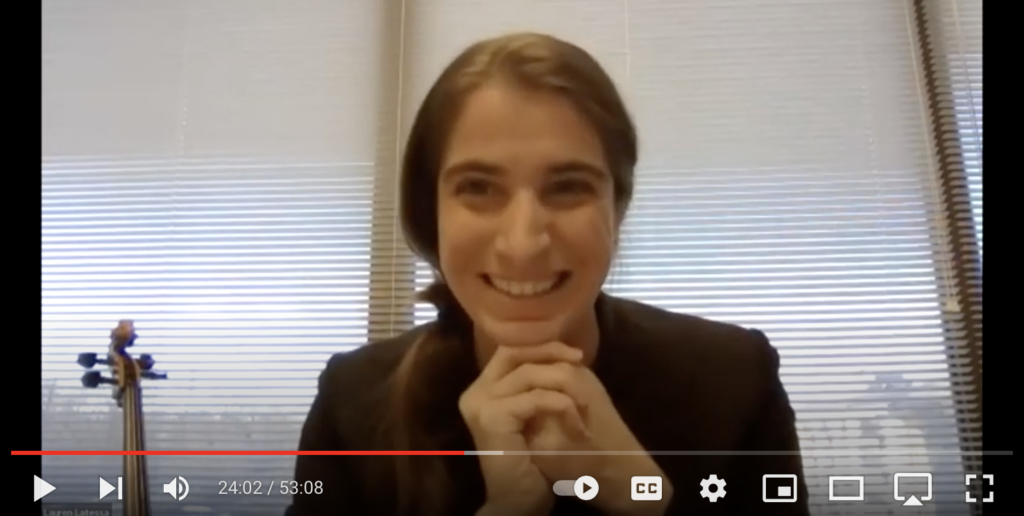This season, violinist and composer Kevin Lowther, a/k/a Big Lux, is our CMW Artist-in-Residence. Lowther works with CMW students on improvisation, listening, and musical explorations, and produced a newly commissioned piece for our 25th Season Reunion Concert. Writer Jill Pearlman connected with Big Lux during a recent group lesson.
The Bigness of Big Lux
by Jill Pearlman
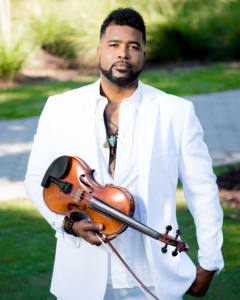
Kevin Lowther is a master of the unexpected turn, the off-ramp, uprooting. In music and in life, he follows mythic displacements and exile that allow him to study himself and the world, take measure of freedom and make meaning. His wanderings and acquired “hats” — from Army officer on the battlefields in Iraq and Afghanistan, to émigré in S. Korea, to political and cultural activist— all lead to the bigness of hip-hop violinist Big Lux.
I’m watching him as he sits all coiled energy, joyously large in his red felt hat, camouflage pants, snaky boots. Lowther is working with CMW students, guiding them in what he knows best — improvisation. Their instruments have been amplified with pickup mikes, and the freedom is both tempting and intimidating. One student restlessly bangs, another plays a yearning melody, with feedback through the soundboard. Lowther, classically trained in his youth, cradles his violin, hooked up to machines, and smiles patiently as he observes their process. “I’m somebody who’s had to improvise his whole life — I’ve spent my life creating a cultural home that I can live in. It’s the same thing I’m trying to provide to students.”
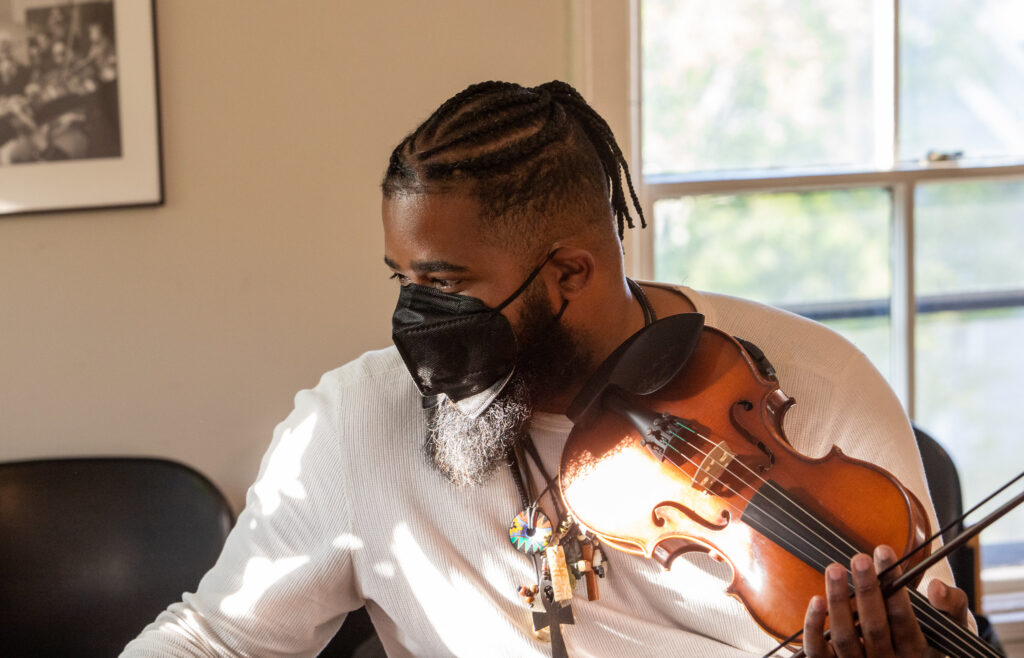
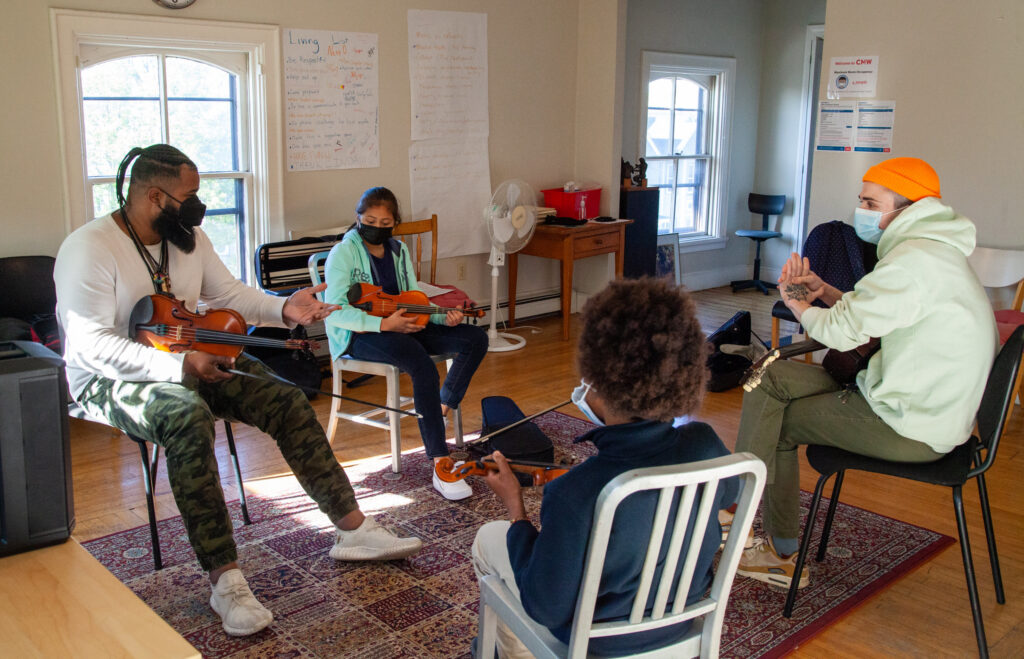
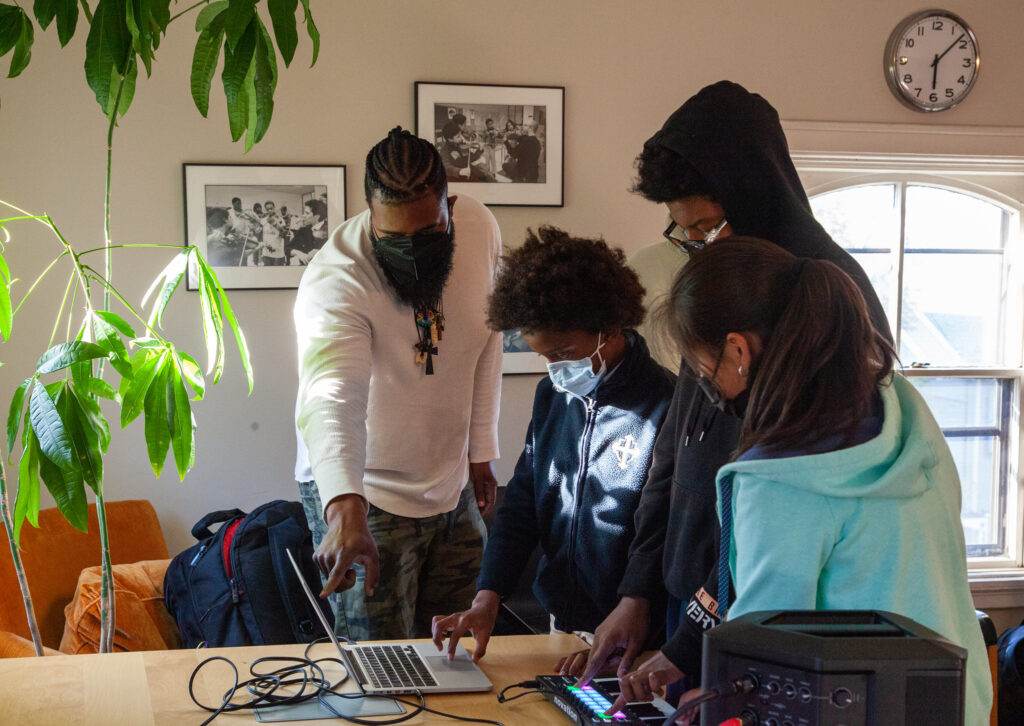
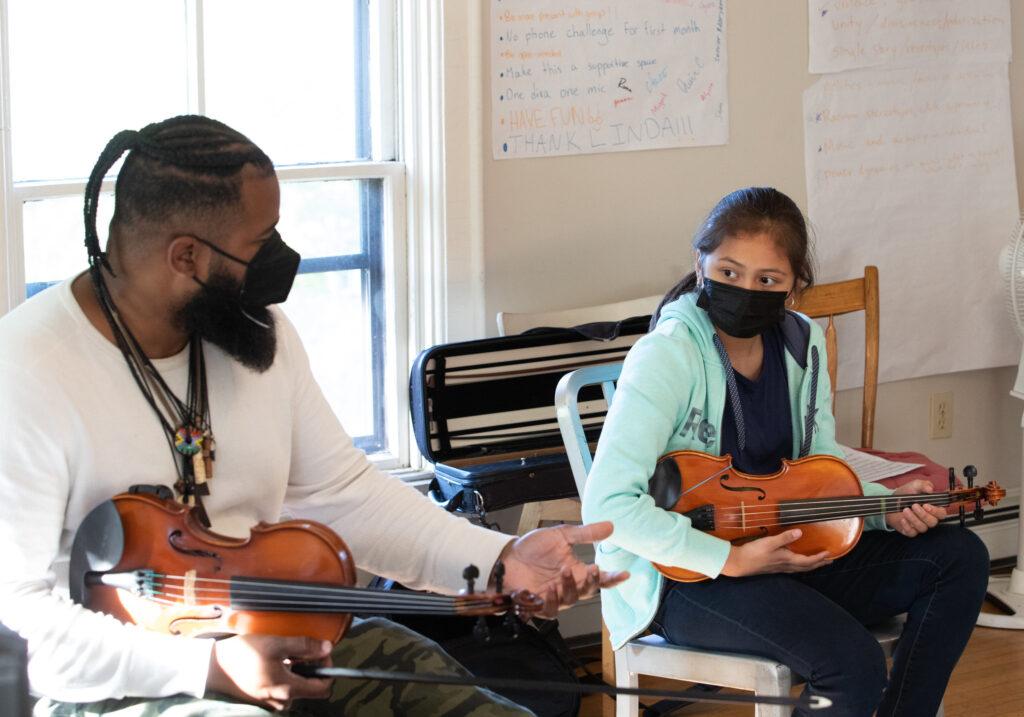
Big Lux improvising with CMW students.
Lowther’s starting point was in Westerly, RI where he was a fiercely devoted violin student, studying Suzuki, playing with the Rhode Island Philharmonic Youth Orchestra. He was often the only one who looked like him in the room.
“What do you do if you stand out?” His plan: “Stand out more.”
Presto! When he was 17, Lowther did an about-face from music and attended the prestigious West Point Military Academy. When September 11 attacks brought on the drumbeat of war he was off to Iraq, starting a different life, outside music, outside the U.S. He’d wanted to be of service to his country and was now, as he says, “living history.” The battlefield experience marked him in the intimacy of war, fear, and knowledge of other political systems.
Lowther also learned that bumping up against difference was a key part of his essential mix. When he returned home, “everything was beautiful, everything amazing… until it became ordinary again.” That was a turning point. “I knew I was going to have to push to have an amazing experience, to travel or perform to feel myself alive. I’m trying to put pedal to the metal to do as much as possible.”
A move to South Korea allowed him to let music rebalance his system. He discovered the affinities of the country and became a luminary on the émigré circuit.
“I’ve spent most of my adult life living outside of the U.S. inside a culture that wasn’t mine — Korean, German, Kuwaiti — and I forced myself to experience those cultures as a native, without diluting it.”
Against that backdrop he kept interrogating his African American identity, his roots in hip-hop, his youth in 95-percent-white Westerly — and his pride in a country that hasn’t lived up to its promise for Blacks. Hip-hop had always been a passion, and he dived full force into its genre-bending expansiveness. He worked his violin to tell truths about war, to put plangent Middle Eastern melodies to a beat, to evoke the high, lonesome whistle of bluegrass. Moving back to Westerly, he also has become an activist — coordinating the Westerly Anti-Racism Coalition, working with town fathers, intent on confrontation that is productive, insistent, but nonviolent. He is now running for Westerly Town Council.
As Lowther handles his violin with supple fingers and bowhand, one can see his utmost gentleness and respect — while meaning business. “My whole life and political strategy has been an attempt to stay in harmony with things around me. I consider the violin a tool rather than anything else. I prefer precise technique to brute force. Force is not the way. I listen to something nuanced and deeper.”
For Community MusicWorks’ 25th Season Reunion concert, Big Lux has composed a ten-minute composition for an ensemble of CMW musicians. Each of the five parts of his piece, “Five Vibes,” explores an emotion, which he has brilliantly named ‘Bubbly, Doubt, Anticipation, Insecurity, and Celebration.’ “If a chamber music piece is playing hip-hop, is it still a chamber music ensemble? That’s the million-dollar question.”
On his latest soon-to-be-released album, Lowther returns to boom-bap – a core and restless joy of ‘90s hip-hop of his youth, all with the violin as his tool and master. He will be debuting some of this fresh work in his concert as one of the headliners for PVD Fest.
Reflecting on CMW students, Lowther says, “It’s very important that CMW is giving them classical education, with history and technique. I’m guiding them a little bit to where they want to be. I’m channeling them towards a cultural home, a place they can express themselves through improvisation or wherever they choose to go. It’s been a privilege.”
***
Join us in celebrating the premiere of Big Lux’s commissioned piece, “Five Vibes,” at the CMW Reunion Concert on Saturday, June 11 at 2 pm at Dexter Park in Providence (rain location is John Hope Settlement House). More information on our events calendar.
Learn more about Big Lux on his website bigluxviolin.com.
Jill Pearlman is a writer, poet, and former CMW board member based in Providence, RI. Read more of her work at jillpearlman.com.
Big Lux portrait photo by Villas Channel Miami Beach Photography
CMW student lesson photos by Erin X. Smithers.
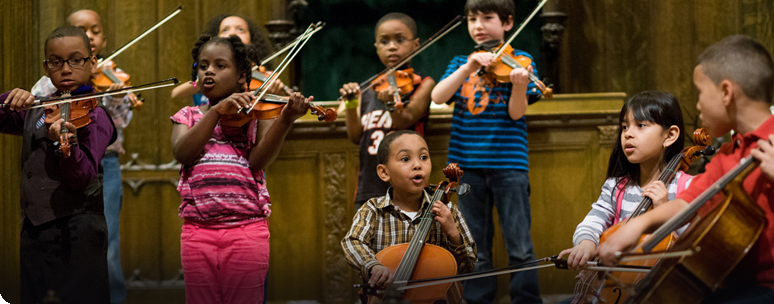
 “CMW is like a family and a home to me…eleven years later and I’ve seen how music can change someone.”
“CMW is like a family and a home to me…eleven years later and I’ve seen how music can change someone.”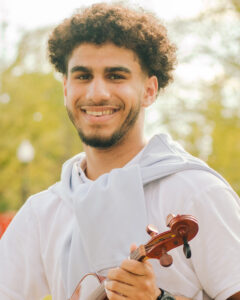 “I play the violin, it’s really cool. Because it’s not very common, it makes me feel unique.”
“I play the violin, it’s really cool. Because it’s not very common, it makes me feel unique.”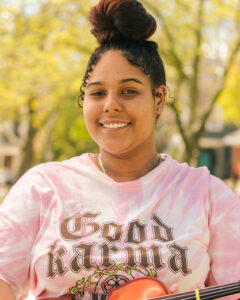 “I will always keep CMW close to my heart. I appreciate the sense of community that we have.”
“I will always keep CMW close to my heart. I appreciate the sense of community that we have.” “CMW is a place where I know I will always be welcomed, valued, and supported.”
“CMW is a place where I know I will always be welcomed, valued, and supported.”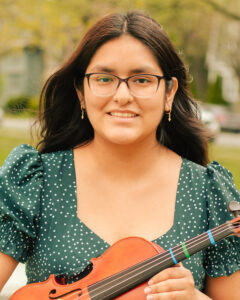 “I had no idea I was going to meet some of the greatest people who I’m thankful to call my friends.”
“I had no idea I was going to meet some of the greatest people who I’m thankful to call my friends.”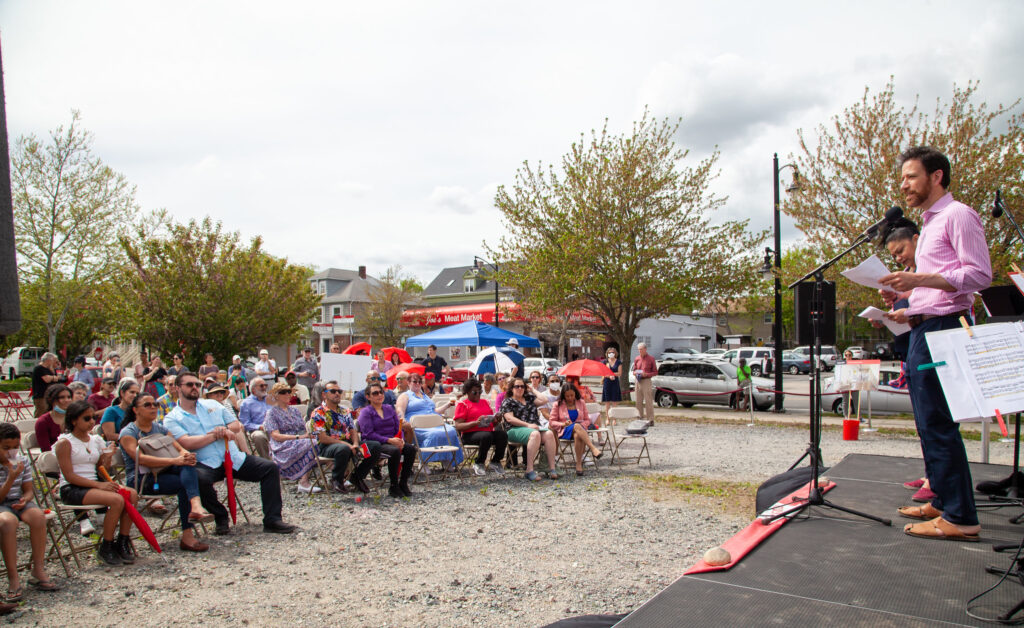 “What we’re going to build here is a community center for music. This is about neighbors helping neighbors; about opening the door for musical possibilities as a way to build deep and solid connections between us.”
“What we’re going to build here is a community center for music. This is about neighbors helping neighbors; about opening the door for musical possibilities as a way to build deep and solid connections between us.” 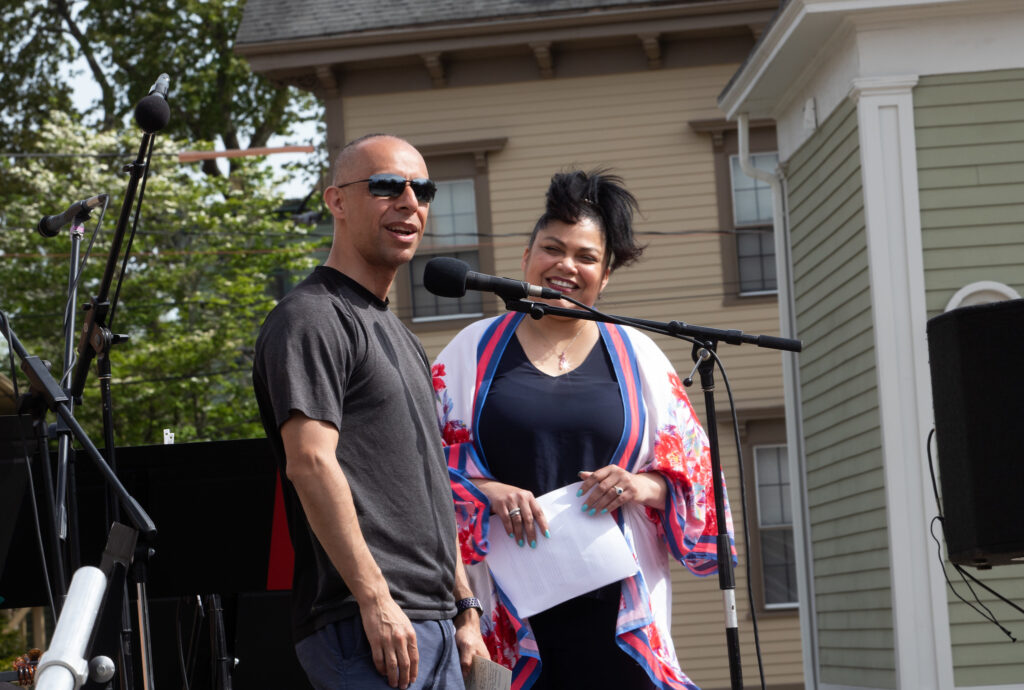 Providence Mayor Jorge Elorza spoke to the crowd. “We are eternally grateful that CMW exists, that CMW is firmly rooted in our community, and that Community MusicWorks is going to grow and build a 15-million-dollar institution that will be around for my kids, and my kids’ kids…long, long into the future.”
Providence Mayor Jorge Elorza spoke to the crowd. “We are eternally grateful that CMW exists, that CMW is firmly rooted in our community, and that Community MusicWorks is going to grow and build a 15-million-dollar institution that will be around for my kids, and my kids’ kids…long, long into the future.”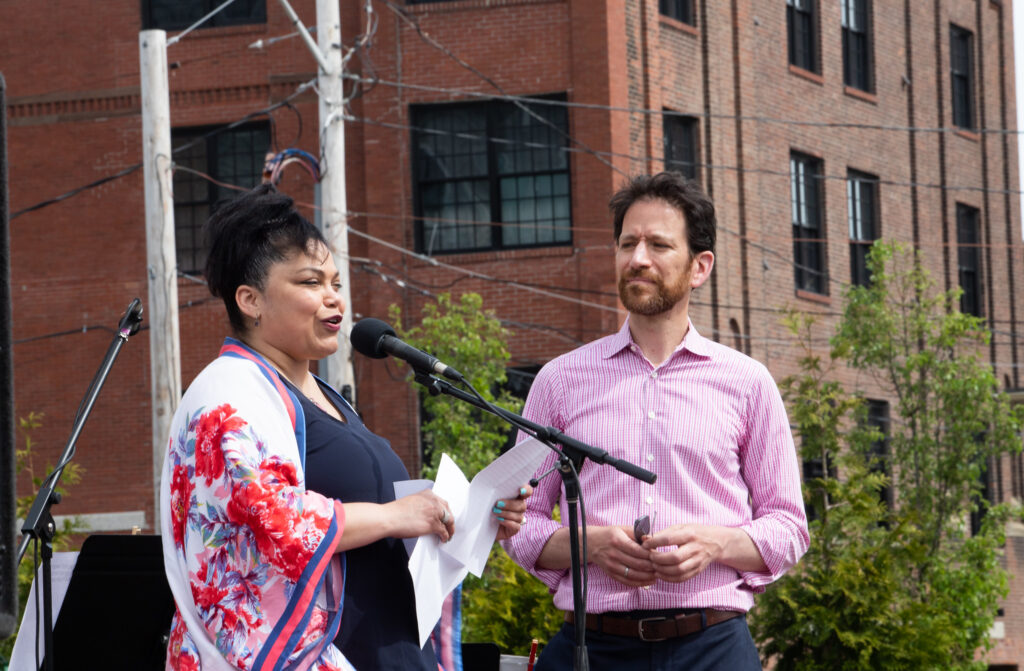 “If CMW has been able to touch so many students and so many lives without a physical location, can you imagine the possibilities once this place is built?” Capital Campaign Co-Chair and former CMW parent Doris De Los Santos hosted the celebration and welcomed a wonderful lineup of speakers and student performers to the stage.
“If CMW has been able to touch so many students and so many lives without a physical location, can you imagine the possibilities once this place is built?” Capital Campaign Co-Chair and former CMW parent Doris De Los Santos hosted the celebration and welcomed a wonderful lineup of speakers and student performers to the stage.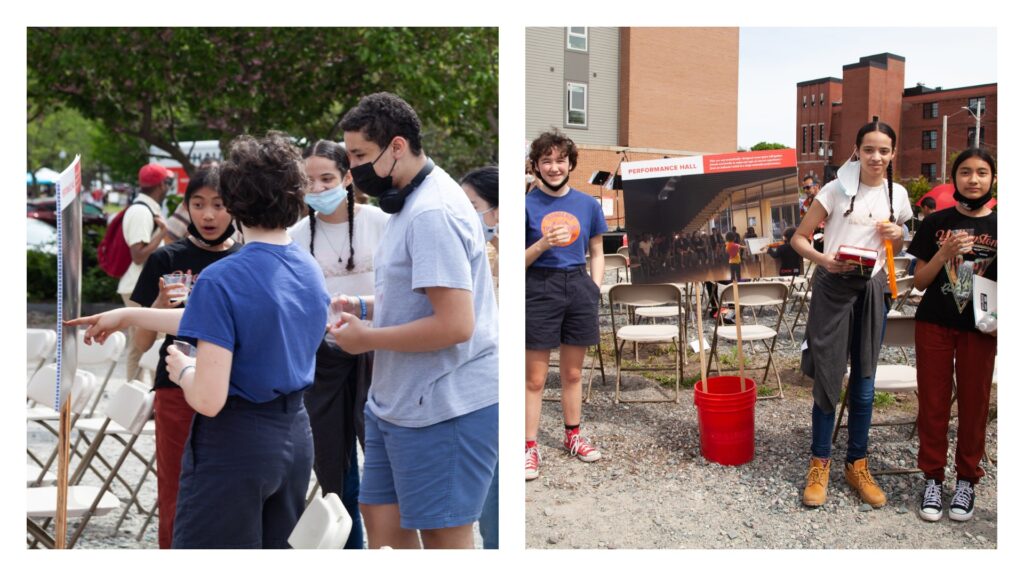 CMW students imagine the possibilities as they admire a rendering of the Performance Hall at the future Community MusicWorks Center.
CMW students imagine the possibilities as they admire a rendering of the Performance Hall at the future Community MusicWorks Center.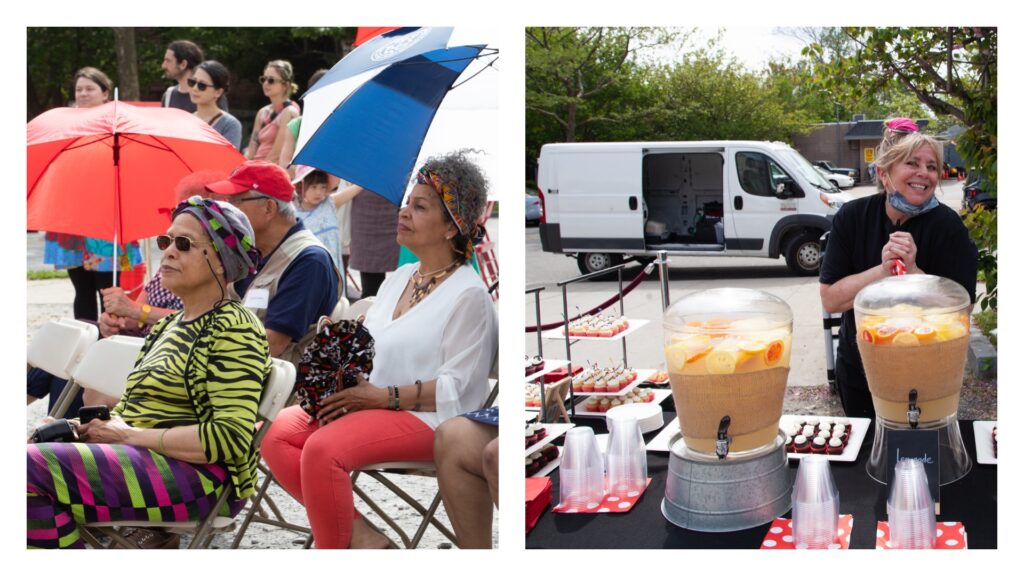
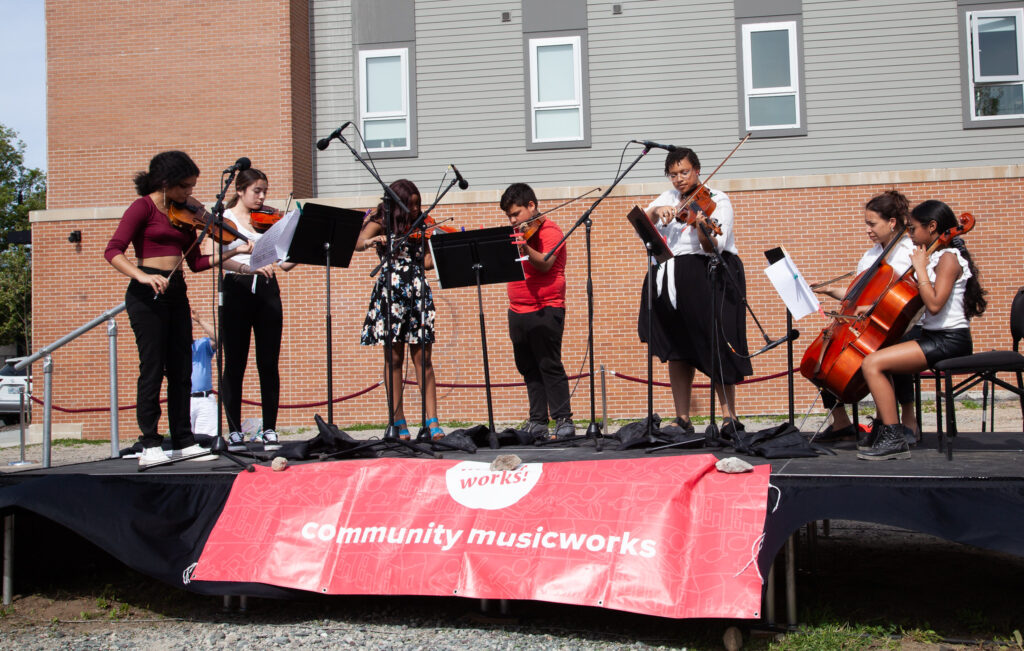 Guests stayed cool with the help of umbrellas and refreshments from Amos House chef Linda Kane while CMW’s Youth Alliance performed an improvisation inspired by the concept of beginnings.
Guests stayed cool with the help of umbrellas and refreshments from Amos House chef Linda Kane while CMW’s Youth Alliance performed an improvisation inspired by the concept of beginnings.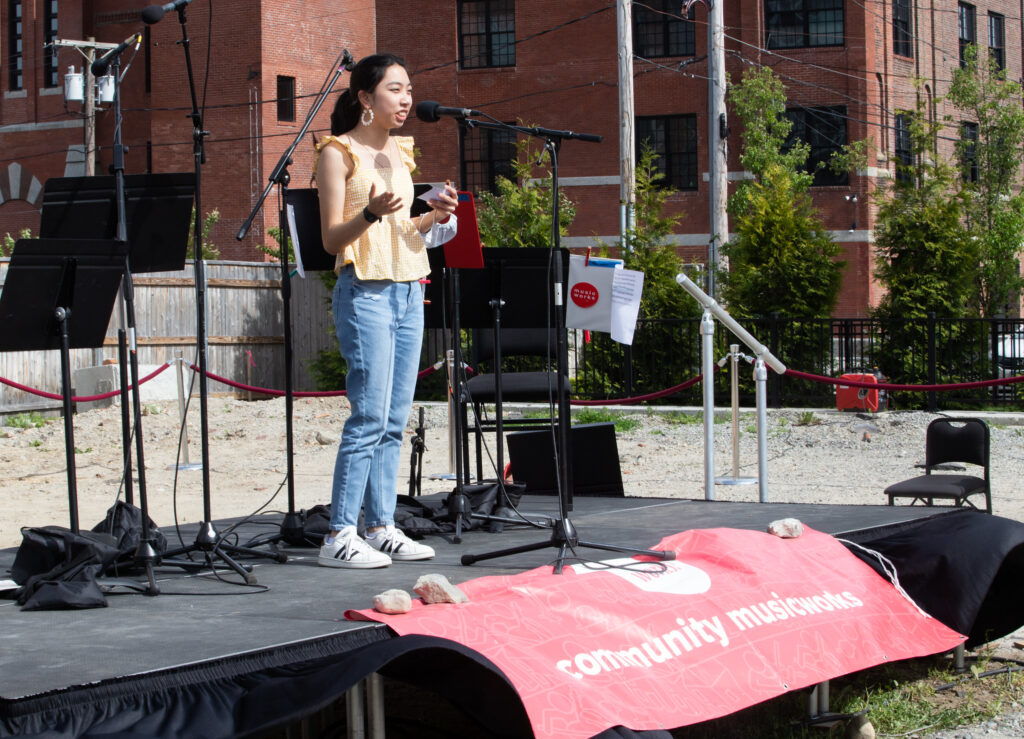 CMW student and board member Jannessa said, “This building will not only continue to support us in being learners and practitioners of music-making but also in spreading love and respect for each other and creating stronger bonds.”
CMW student and board member Jannessa said, “This building will not only continue to support us in being learners and practitioners of music-making but also in spreading love and respect for each other and creating stronger bonds.”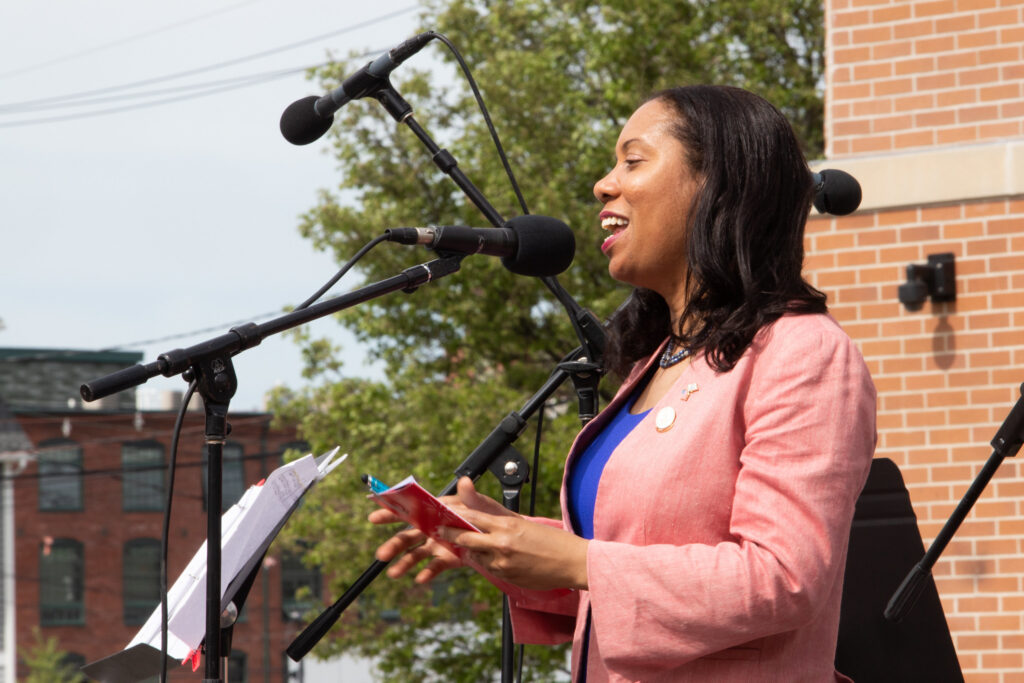 RI Lieutenant Governor and former CMW parent Sabina Matos: “The work that Community MusicWorks does to help us to be sure that we have access to art for our children here in the city of Providence is crucial. Community MusicWorks has given us the opportunity to bring equity to this neighborhood.”
RI Lieutenant Governor and former CMW parent Sabina Matos: “The work that Community MusicWorks does to help us to be sure that we have access to art for our children here in the city of Providence is crucial. Community MusicWorks has given us the opportunity to bring equity to this neighborhood.”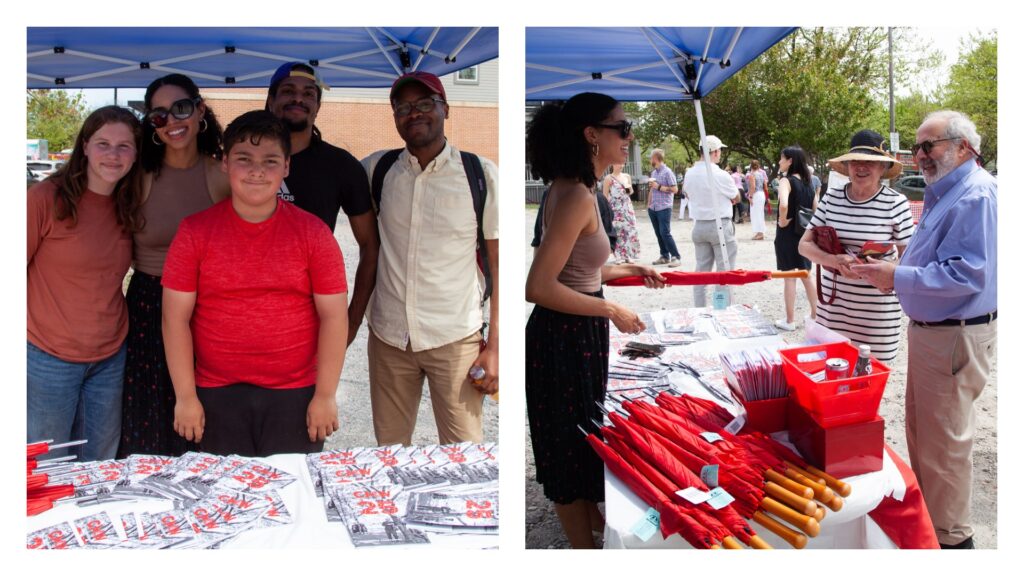 Extra-special shout-out to alums, students, staff, and supporters who pitched in to make this important day…and every day at CMW…a big success! Thank you!
Extra-special shout-out to alums, students, staff, and supporters who pitched in to make this important day…and every day at CMW…a big success! Thank you!
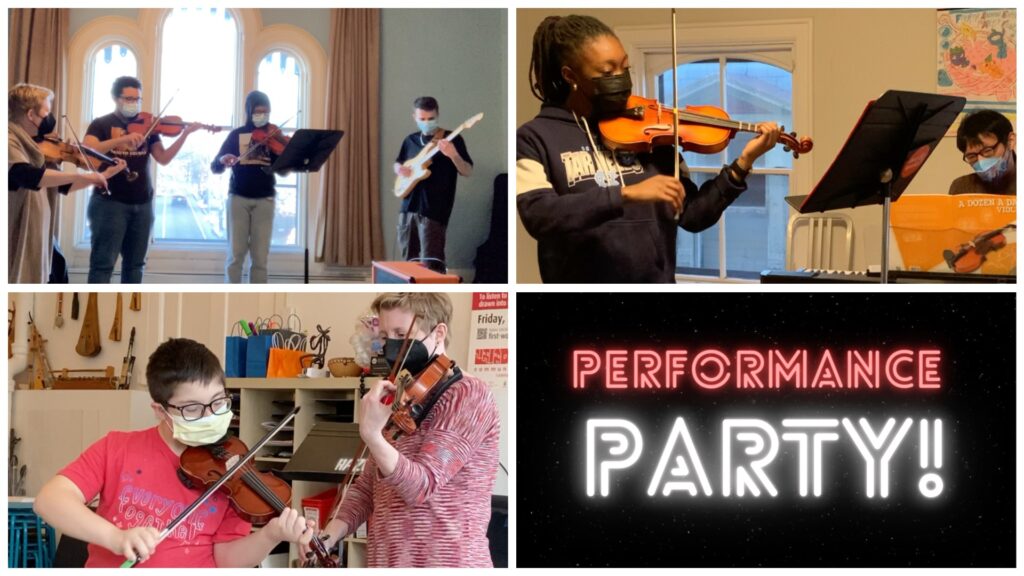

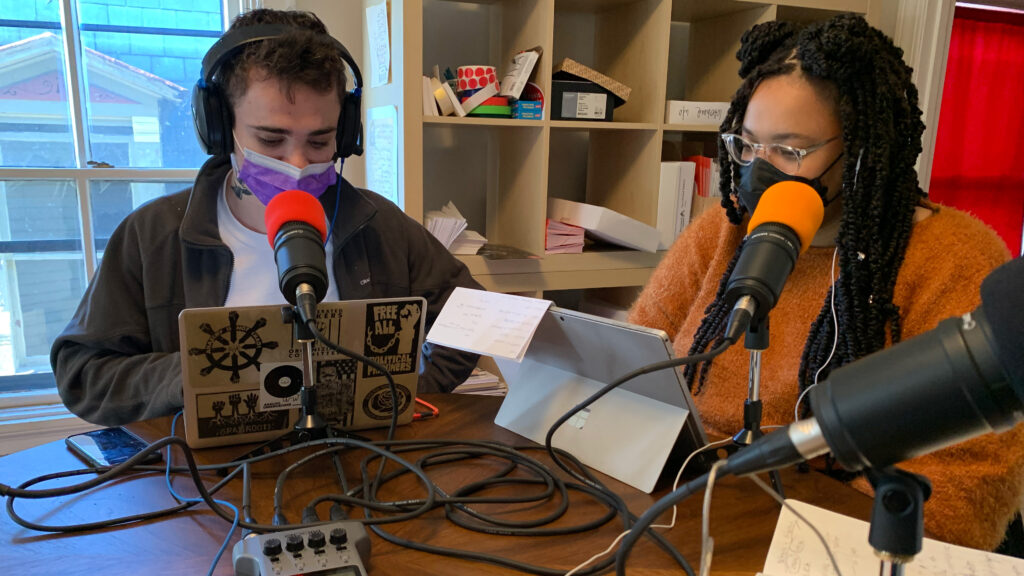
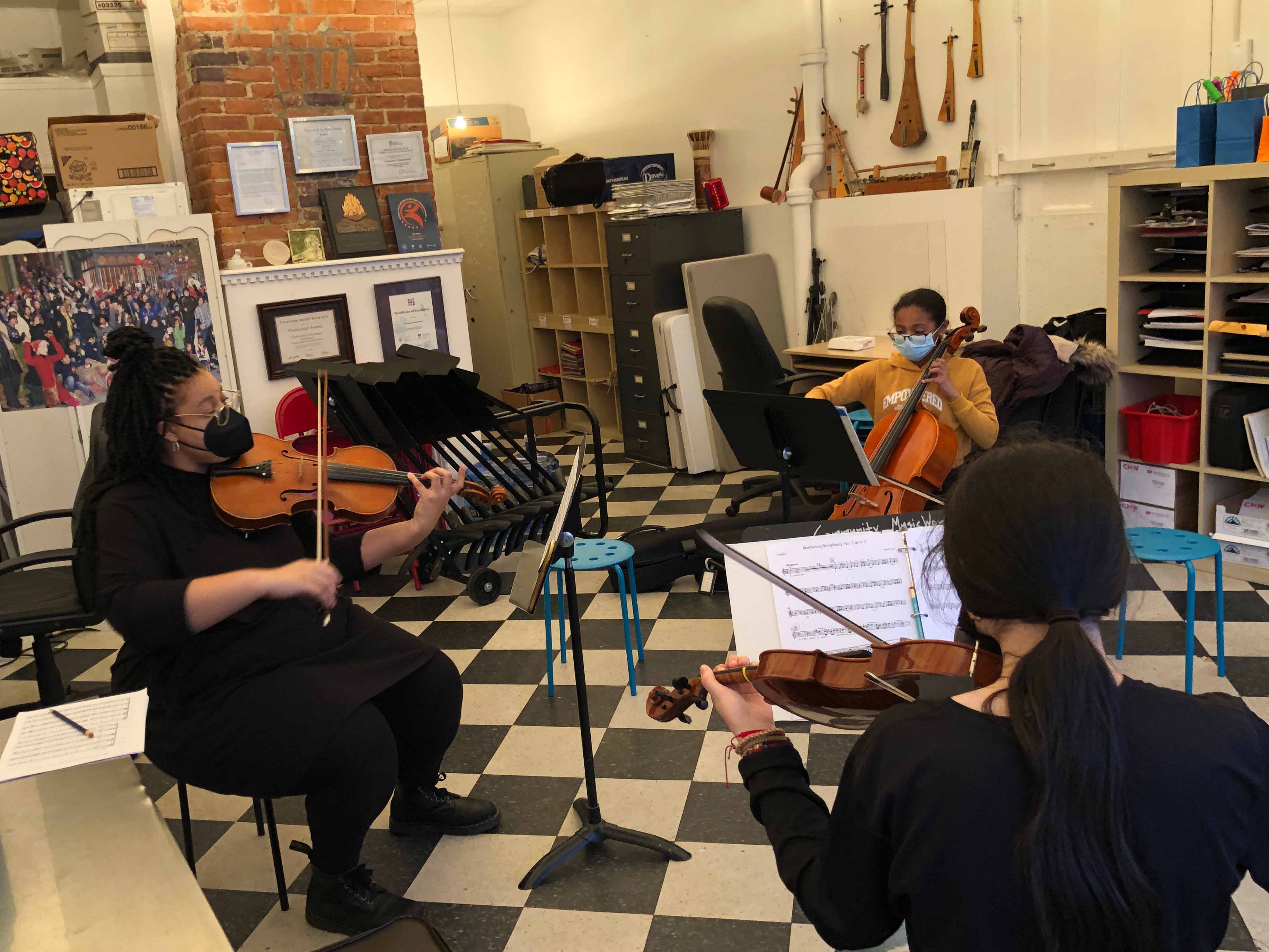 Alexis leads a rehearsal with CMW’s Youth Alliance
Alexis leads a rehearsal with CMW’s Youth Alliance